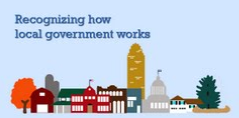Today MCF announced the 2015 Ron McKinley Philanthropy Fellows. The Fellowship, launched as a partnership with the Bush Foundation in 2013, prepares high-potential individuals from underrepresented communities for careers in philanthropy.
Fellows are employed by MCF and placed at participating foundations for three years. This year’s Fellows will join the Bush Foundation, the Headwaters Foundation for Justice or The Minneapolis Foundation, where they will start on January 12, 2015.
“For foundations to remain credible partners, their staff must reflect the shifting diversity of communities,” says Alfonso Wenker, MCF’s director of diversity, equity and inclusion. “These leaders bring strong community relationships that will help position their host sites for the future.”
 Meet the 2015 Ron McKinley Philanthropy Fellows:
Meet the 2015 Ron McKinley Philanthropy Fellows:
- Allison Johnson (pictured, middle) is a community organizer with Beacon Interfaith Housing Collaborative, where she has worked across the Twin Cities to build support for affordable housing and stronger communities. She will join the Headwaters Foundation for Justice.
- Aya Johnson (right) is currently a community representative in the United States Congress focusing on immigration, foreign affairs, unemployment and outreach to communities of color. She has also served as a domestic violence advocate in St. Cloud and Blaine. She will join the Community Innovation team at the Bush Foundation.
- Adrian Mack (left) is presently the program and curriculum director of STATURE, a leadership program designed to guide Minneapolis youth toward academic and career success. He also participates in several initiatives to engage the broader African American community. He will join the Bush Foundation’s Community Innovation team.
- Patrice Relerford (second from right) is now the institutional support coordinator and grantwriter at People Serving People, a family-oriented shelter that provides emergency housing and community services to help homeless families achieve stability and reconnect with the community. She began her career as an education reporter at the Star Tribune and will join the Community Impact team at The Minneapolis Foundation.
- Avi Viswanathan (second from left) has served as the campaign director for HIRE Minnesota, a campaign working to achieve racial equity in employment. He lives with his family on the East Side of St. Paul where he is engaged in many community activities and has served on the Dayton’s Bluff Community Council. He will join the Leadership Programs team at the Bush Foundation.
“I’ve seen firsthand how poverty and inequality erode communities,” says Fellow Patrice Relerford. “Through this fellowship, I believe I can better understand disparities by asking the tough questions to find solutions. For example, why does our region continue to have such glaring academic achievement, employment and home ownership gaps between whites and people of color?”
About the Ron McKinley Philanthropy Fellowship
The Fellowship is dedicated to the late Ron McKinley, a longtime member of the philanthropic and nonprofit communities who embodied justice and equity and worked tirelessly throughout his career to ensure that those from underrepresented communities were afforded equal access, opportunity and the resources necessary to fully participate and be heard.
Applications for the 2016 Ron McKinley Philanthropy Fellowship will be open in fall 2015. Learn more at http://www.mcf.org/about/philanthropy-fellowship or contact Alfonso Wenker, MCF’s director of diversity, equity and inclusion, with any questions.
Photo credit: Anna Min, Min Enterprises
 MCF President Trista Harris has been awarded a 2015 Bush Fellowship!
MCF President Trista Harris has been awarded a 2015 Bush Fellowship!


 Posted by MCF Webmaster
Posted by MCF Webmaster 







